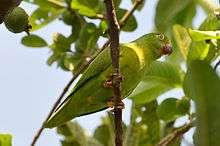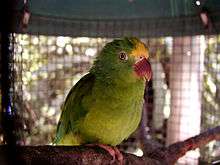Tui parakeet
The tui parakeet (Brotogeris sanctithomae) is a species of bird in the family Psittacidae, the true parrots. It is found in the Amazon Basin of Brazil, and Amazonian Peru and Bolivia; also a minor range into eastern Ecuador, and the river border of far south-eastern Colombia.
| Tui parakeet | |
|---|---|
 | |
| At Uarini, Amazonas, Brazil | |
| Scientific classification | |
| Kingdom: | Animalia |
| Phylum: | Chordata |
| Class: | Aves |
| Order: | Psittaciformes |
| Family: | Psittacidae |
| Genus: | Brotogeris |
| Species: | B. sanctithomae |
| Binomial name | |
| Brotogeris sanctithomae (Müller, 1776) | |
It is restricted to várzea and other wooded habitats near water. It is rare or entirely absent away from large rivers.
Description
The tui parakeet is a fairly small green parrot with slightly darker wings, and a medium to short, rather wedge-shaped tail. It has a yellow forehead-spot, a relatively dark reddish-dusky bill, a complete white eye ring, and dull yellowish or whitish irises. The eastern subspecies, B. s. takatsukasae, has a small yellow post-ocular spot, which the western nominate subspecies (B. s. sanctithomae) usually lacks.
Taxonomy
This parrot shares the genus Brotogeris with seven other species of parrots, but is closest to the yellow-chevroned parakeet (Brotogeris chiriri).[2]
Distribution
Amazon River corridor, and South-West Basin range

The tui parakeet is found along the Amazon River in a corridor from Ilha de Marajó in east. The Amazon river-wildlife corridor is of variable width, the tui parakeet generally only occurring in the vicinity of major rivers, and continues upstream to the confluence of the southwest Basin's Purús River. A short north range exists up the confluence of the Rio Negro about 250 km. Peculiarly, it is absent from a small section of the Amazon river immediately east of Manaus in Brazil; this "hole" in its distribution also forms the border between the western nominate subspecies (Brotogeris s. sanctithomae) and the eastern B. s. takatsukasae.
In the southwest Amazon Basin, the tui parakeet ranges more widely, it being present in the vicinity of several large rivers such as the Solimões River, Madeira River, Madre de Dios River, Purús River, Juruá River, Ucayali River and lowermost Marañón River. This range includes parts of northern Bolivia, most of the south-western Amazon in Brazil, and all of Amazonian eastern Peru, except the northern regions near the borders with southern Colombia and Ecuador. The exception is the southeast border tongue of Colombia (near Leticia and Puerto Nariño) that extends south and borders the Amazon River. Here is the only range in Colombia of the tui parakeet, as a "restricted-range" species in Colombia, about 150 km.
A small range of the tui parakeet goes upriver along the Napo River in northeastern Ecuador. In the southwest Amazon Basin, its eastern limit is around the Madeira River.
References
- BirdLife International (2012). "Brotogeris sanctithomae". IUCN Red List of Threatened Species. 2012. Retrieved 26 November 2013.CS1 maint: ref=harv (link)
- Tavares, E.S.; Baker, A.J.; Pereira, S.L.; Miyaki, C.Y. (2006). "Phylogenetic relationships and historical biogeography of Neotropical parrots (Psittaciformes: Psittacidae: Arini) inferred from mitochondrial and nuclear DNA sequences". Systematic Biology. 55: 454–470. doi:10.1080/10635150600697390. PMID 16861209.
External links
- Tui parakeet photo gallery VIREO Photo-High Res
- Stamps (for Brazil) minor showing of bird Article "Bird Stamps of Brazil"
- Photo-Medium Res; Article lib.Montana.edu—"Brotogeris"
